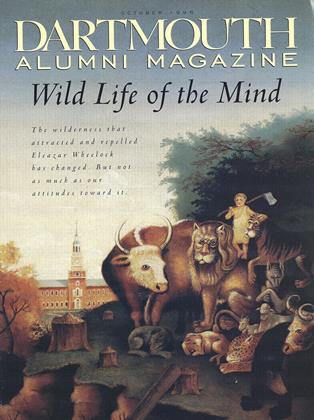The lasting value of research is sometimes unforeseen.
1893
President Tucker shocks the Trustees by insisting that Dartmouth create a biology department. Tucker further aggravates Christian conservatives by recruiting evolutionary theorist William Patten to head the new department. Within months, grad students on campus are studying arachnid embryology.
1899
Patten publishes "On the Origin of the Vertebrates from Arachnids."
1902
Biologist turns paleontologist: Patten spends the next 12 summers digging in northern New Brunswick.
1912
Patten travels to New Guinea in search of spiders and scorpions. In his spare time he assembles a collection of native art.
1920
A new freshman course in evolution is taught by Patten so he can have contact with younger students.
1921
Several hundred tarantulas arrive in Hanover for delivery to Professor Patten.
1928
Patten tells the press he doubts that a "missing link" will be found between man and ape.
1929
The teacher of choice for Hanover women in need of ice waltz instruction is Professor Patten, an accomplished figure skater.
1931
Patten tells a gathering of scientists that ostraderms, relatives of the horseshoe crab, are "the foundation for the human race."
1932
On the Baltic Island of Oesel Patten directs the excavation of the largest and most representative collection of early and primitive ostracoderm fauna. Shortly after his return to Hanover, Patten has a heart attack and dies. The New York Herald Tribune notes Patten's passing: "The death of Professor William Patten, of Dartmouth College, put a period to a scientific reputation won in spite of being wrong."
1952
The journal American Midland Naturalist publishes a list of 23 fossils Patten had discovered. The list includes CephalaspisPattern, DartmuthiaGemmifera,Tremataspis Patteni, and Witaaspis Patteni.
1996
Patten's foresight in collecting Oceanic art is recognized by an exhibition in the Hood Museum.
Eighty years ago William Patten made headlines by claiming man descended from spiders. His other work in New Guinea still serves Dartmouth.
 View Full Issue
View Full Issue
More From This Issue
-
 Feature
FeatureThis Man Is an Island
October 1996 By ROBERT SULLIVAN '75 -
 Feature
FeatureNaming the Animals
October 1996 By Robert Pack '51 -
 Feature
FeatureDON'T CALL HIM ANONYMOUS
October 1996 By Jeanhee Kim '9O -
 Cover Story
Cover StorySecond Nature
October 1996 By Jay Heinrichs -
 Feature
FeatureDartmouth's Night
October 1996 -
 Article
ArticleKnowing Your Place
October 1996 By Jim Collins'84







